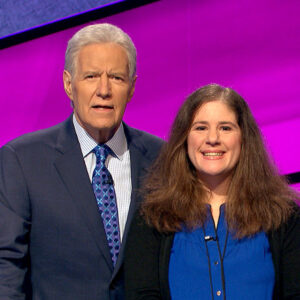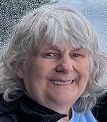Teacher fulfills dream with appearance on legendary game show

Hopkinton High School English teacher Shari Meyer made an appearance on “Jeopardy!” with longtime host Alex Trebek.
It’s the ultimate for any trivia buff: an appearance on the long-running television game show “Jeopardy!”
Hopkinton High School English teacher Shari Meyer finally got her chance to live out a dream, flying to Los Angeles and appearing on the penultimate episode of Season 35 that aired July 25, more than three months after it actually took place.
And while it did not end as she had hoped — Meyer finished third in a close game that came down to the final question — it’s an experience she won’t soon forget.
Her journey began when she took an online quiz through the show’s website.
“This was my second time taking the online test,” said Meyer, who also unsuccessfully tried out for the “Jeopardy!” Teen Tournament back when she was in high school in Staten Island, New York. “Everyone who gets on the show starts the same way, with the online test. They offer it a couple of times a year. It takes about 15 minutes. You have 12-15 seconds to type in an answer, and there’s 50 clues. I knew I had done pretty well on that. Then you wait. And if you get lucky they call you.”
Meyer eventually did get a call, and she was invited to an audition being held at the W Boston hotel. In case she wasn’t nervous enough, Meyer had a personal reason to be even more worried.
“I told this story on the show about my son, who will be 2 in September,” she said. “Well, when I auditioned he was 2 months old. It was November of 2017. It actually was the first time I had left my son for more than like an hour, hour and a half, because he was still so little.”
For the in-person audition, candidates take a written test and are taken three at a time to play a mock game, which is videotaped. They are told the show will keep their information on file for 18 months.
Meyer’s window was closing when she finally for the call this past March, some 16 months after her audition.
“I really had given up hope,” she said. “I was shocked when they called. It was March 15th and they said, ‘Can you come on April 6th?’ And I was like, ‘OK!’ And then I hung up and was like, well, now I have to figure out that whole part of getting there. Do we bring our child, do we leave him home? We hadn’t left him overnight with anybody. So there was a lot of logistical things to figure out fairly quickly.”
She also needed to get in some final preparation. In addition to catching up on past episodes of the show, which she had sitting in her DVR, she listened to a couple of trivia-based podcasts during her commute to and from work.
Meyer, a Boston University graduate who is heading into her ninth year teaching at HHS, said she didn’t spend much time on her weaker subjects like physics and astronomy, feeling that she had too much ground to make up and not enough time to do it. So she just hoped that they would not be categories when she played.
“Being a teacher is a pretty demanding job, and having a toddler at home, it’s a lot,” she said. “And I live in Somerville, I drive an hour each way for work, so it doesn’t leave a whole lot of extra time for studying. So what I decided to do was shore up some areas that I felt were strengths. I didn’t work on my strongest strengths — I didn’t study lists of authors of books, like I really know that stuff. But I borrowed a couple of other teachers’ [study aids], like the history teachers, I got AP flashcards from them. And I did buy a little atlas and I studied maps a little bit just to get a sense of what bordered what. So, stuff that I felt like was a little refresher — like, I knew this at one point in my life, and if I can refresh it it would be good.”
Meyers and her husband — their son ended up staying back with his grandparents — flew to Los Angeles on a Friday, the day before the taping. The show films five episodes in one day, and because they were the final five games of the season, with a months-long break before the next taping, Meyer knew that even if she won she could return on Sunday and be back at Hopkinton High School for classes on Monday.
On Saturday morning, Meyer was picked up by a shuttle at her hotel at 7 a.m.
“They do a pretty lengthy contestant briefing session in the morning with lots of rehearsals,” she said. “Then they tape three shows. Then there’s a lunch break, and they provide lunch for anyone who wasn’t on the first three shows. After the lunch break they film the next two.”
After lunch, Meyer was tabbed to appear on the first afternoon game.
Her opponents were Eric Kaplan, a retired physician from Southern California, and defending champion Jason Zuffranieri, a math teacher from New Mexico.
When Meyer left Boston, shows had just started to air featuring James Holzhauer, the Las Vegas gambler who went on a record run on the show, winning 32 games and almost $2.5 million. Meyer was relieved when she got to the taping and Holzhauer was nowhere to be found, as he was one of the most dominant players in the show’s history.
Her show finally began, and she quickly realized it was going to be more challenging than she thought — mainly because contestants have to time their buzzer just right in order to even have a chance to respond to the clue being read by legendary host Alex Trebek.
“I tried to buzz in on many more of those clues, which is so obvious if you watch it on TV, you can see me furiously ringing in,” she said. “There are lights alongside the board that you can’t see on television. When Alex finishes reading the clue, there’s someone sitting on the side who then flips a switch, those lights go on, and those lights are the cue that, OK, your buzzer will work now. So it’s not just do you know the stuff but can you time the ringing in of the buzzer. I went through many, many scenarios of things that could go wrong, and one of them absolutely was I wasn’t going to get the hang of the buzzer.”
After the first round, Meyer had $3,200. Kaplan led with $6,800 and Zuffranieri was at $6,000. In the second round, in which the money values are doubled, Meyer had her only miss in 11 responses during the first two rounds, a question about the movie “Captain Marvel,” and it was a costly one: $1,200.
Meyer said as the game went on and she sat firmly in third place, it started to affect her.
“I feel like I spent way too much time looking at the scores and looking at how poorly I was doing relative to the others in the second round,” she said. “It started to build some frustration, and I wonder if I’d just been more focused on ‘Clue, ring in, respond,’ ‘Clue, ring in, respond,’ if I would have been a bit better on the buzzer.”
Heading into Final Jeopardy, which consists of one last question, Meyer was in third place with $6,000 but still in striking range, as her competitors had $14,400 and $12,000. Had she been able to answer the final question she would have won, as the other two players also got it wrong. However, she bet all $6,000 — bets have to be made before the clue is revealed — and had no response. She joined Kaplan with no money in the end, while Zuffranieri finished with $4,400.
The Final Jeopardy clue, in the category “1970s Album Reviews,” was a tough one: “[The magazine] Rolling Stone said this 1976 album had ‘the best and worst tendencies of LA-situated rock’ and was an ‘unflattering portrayal of the milieu.”
“I went through a classic rock phase, and I really hoped it was going to be about Pink Floyd, ‘Dark Side of the Moon,’ then I’ve got this,” Meyer said. “I’m just going to put the bet and hope for the best. I just didn’t work out that way.”
Meyers left her response blank, after what she called “the fastest 30 seconds of my life.”
The answer was the Eagles’ “Hotel California.”
As it turns out, she could have won the game had she bet nothing — although she obviously had no way of knowing the other competitors would miss the clue as well. But that made her second-guess herself.
“That’s another thing that people say you should be prepping before you go on the show, is really learning how to do that wager math,” she said. “My other nightmare was I would have no idea what to do with the knowledge of how much money separates each person, and sure enough, I had no idea what to do. … I guess I went for a Hail Mary, wagering everything.”
After her wager and response were revealed, she looked into the audience in the direction of her husband, who was sitting toward the back.
“I looked over to him — you can see it a little bit on camera — right after it was revealed I didn’t have an answer,” she said. “I looked at him and made some sad eyes. I had a couple of friends who came as well, who live out in California. So I wasn’t just looking at him, I was looking for any empathy I could get from my mini-cheering section. It’s really intense up there.”
With her appearance complete, Meyer stayed to watch the taping of the season’s final episode. A number of well-known past champions had showed up to support Trebek, who recently was diagnosed with Stage 4 pancreatic cancer. Although there was speculation he might retire, Trebek has returned for the 36th season, which recently started taping.
As for her interactions with Trebek, Meyer said: “It is what you see on TV, and that is it.”
“I think he has to keep distance so that everything’s on the up and up, legally speaking,” she said. “I was pretty neutral on him going in. I’m not a super fan the way some people are. But he really is the show. And he’s a consummate professional. He’s funny, he’s gracious, he answered so many of the audience’s questions during every single commercial break.”
The next day, Meyer returned to Boston, and she was back in school that Monday.
She had to sign a nondisclosure agreement that stipulated she would forfeit her prize money if she revealed results of her game and it became public. She informed her parents and in-laws, but kept the details a secret at school.
“The people who asked the most questions, probably not surprising, were my students,” she said. “Some of them were really persistent during the [James Holzhauer] era, because they wanted to know if I had to play against him. It was kind of fun having that be a secret that I knew and they didn’t, like, nope, he will lose eventually, and it will be before I get there.”
In all, Meyer looks back on her whirlwind experience with pride.
“They tell you when you’re in the contestant room that something like 40,000 people a year take the online test, they have about 4,000 audition and they have 435 spots for a season,” she said. “So, you’re really already in the 1 percent. And I kind of thought about it, two-thirds of the people who go on the show lose on every episode. And when you catch a champion on a streak …
“I did feel sorry for myself a little bit. And there was some emotional processing that I needed to after the loss. But he beat us all. He beat everyone. He’s a Tournament of Champions-caliber player. He’s another teacher. He was a nice person. So I tried to keep my pity party in check.”
In the following game, Zuffranieri trounced his two competitors, ending the season as a six-day champ, with $137,300 in total winnings.
Meyer, meanwhile, received $1,000 for finishing third, along with a tote bag, a hat and a pen.
“I can’t complain losing to a Tournament of Champions-level player,” Meyer said. “I’m still glad it wasn’t [Holzhauer]. All those contestants, it’s their lifelong dream, too, and he basically mowed everyone down. So I’m glad like I felt like I had a fighting chance.”





















0 Comments